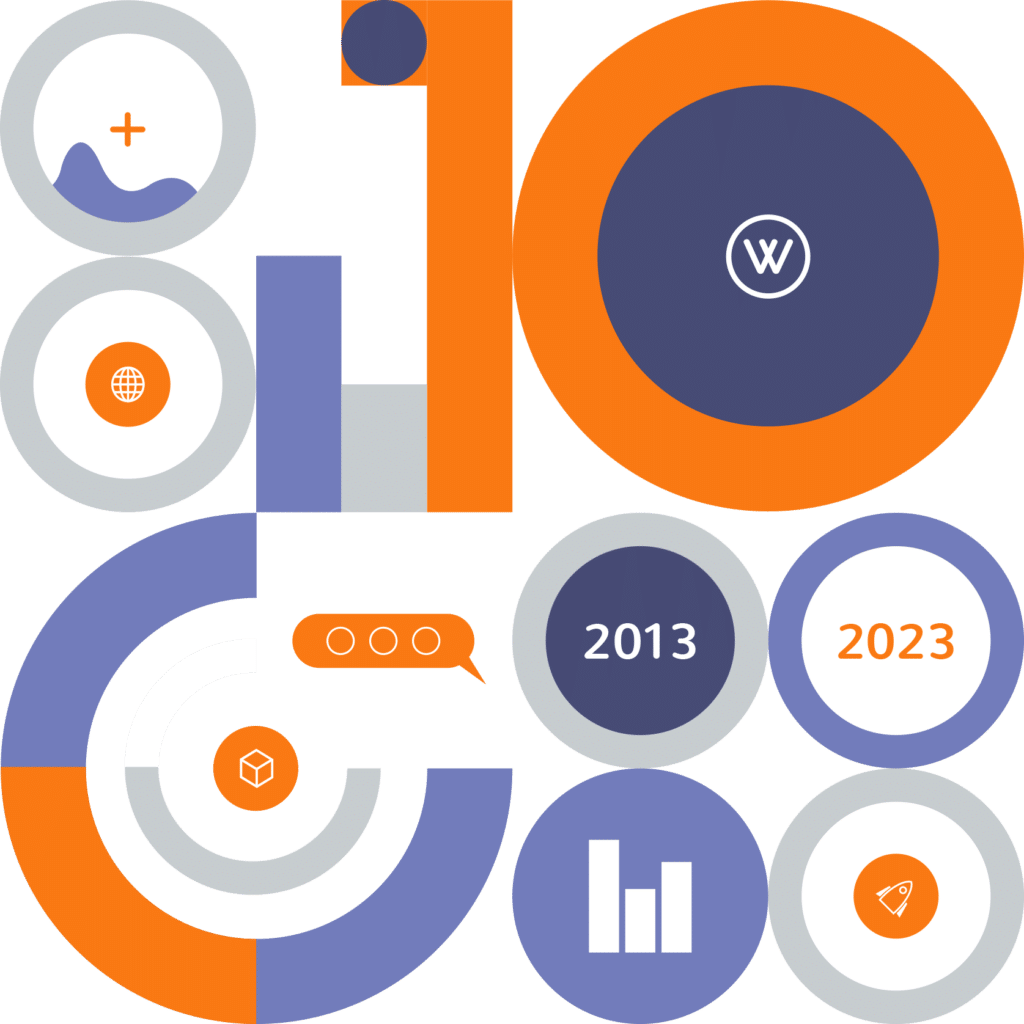To mark the 10 year anniversary milestone of Wine Owners, one of the newest members of the team (Steph Dampier, Marketing Manager), interviews co-founder Nick Martin, to explore how a collection management platform and trading exchange grew into an industry must-have business management platform adopted by wine-trade specialists worldwide.

Happy Anniversary! 10 years is an achievement most start-ups dream to reach, you must be thrilled?
Thank you. Yes, thrilled! All the more so because the business has become increasingly part of the global wine industry, and that’s a thrill too.
Can you take us to the beginning, how Wine Owners started?
Well it started with a love of wine and a passion for data. I got into wine around the mid-1980s, built a half-decent collection over the course of 25 years, and along the way had bought wine from quite a lot of merchants and direct from producers. I had a subjective view of a wine consumer’s unmet needs and a perspective of what could be done better by suppliers.
Luckily I had a friend, Wolter Visscher, with an engineering background who had his own software development firm. I’d led an information business within a large publishing group when we first worked together, and had gone on to run the UK for a Fortune 500 database management business. So fair to say our shared passion for data and information management eventually intersected with my love for wine, and that led us to create Wine Owners. Meantime he’d sold his company. Looking back, it was a natural outcome.
As data geeks, we also knew that the key to building something with real utility meant that we had to create a data model that fully reflected the complexities and subtleties of the wine trade.
So it wasn’t surprising that our very first hire was a data specialist, Jonathan Picchi (he’s celebrating 10 years at Wine Owners this year too, along with our Head of Marketing, Clotilde Muller).
Wine Owners now offers the much heralded Wine Hub platform, serving the wider wine trade, how did this come about?
Progressively!
Wolter and I had a hunch when we started Wine Owners, that the same technology for collection management could help address customer relationship management needs of the wine industry. So in the beginning we developed and launched a fully-featured, information rich collection management platform with its own peer to peer exchange (Wine Collector). Wolter engineered it as a white label so that it could be adopted by wine businesses to manage their clients’ storage needs better, and that was how Wine Owners began.
In fact our first ever technology client was Corney & Barrow, who were actually using the collection management platform for their storage clients before our first full release – and where it continues to be used today. We’ll be forever grateful for their early support.
The Collector caught the attention of a warehouse in the USA in 2015. I remember well one morning (UK time) Joel from Western Carriers called me up with questions about how he would be able to use it for his fine wine storage operation. He’d been looking for something like The Collector that he could configure to his needs and plug into his operation for over a decade, and there we were!
Western Carriers has a reputation for being the gold standard of wine storage and logistics over there, which was a great initial association, and then working with Lars and Gretchen at The Wine Cellarage we further built out Wine Keep in 2017, a wine-specific warehouse management system integrated with The Collector. Since then over 20 warehouse locations across North America have adopted Wine Keep.
The build-out of Wine Keep for third party logistics warehouses caught the attention of several wine merchants who approached us during the course of 2018 to develop a wine and spirits business operating system. They figured that we had the essential experience for creating what they needed: namely a wine specific data model; wine reference data; workflow management for logistics and management of all the different inventory types in this market and their processing. Special thanks to Gilles Corre from Asset Wines, who had a background in software development, and with whom we worked on prototyping, along with early adopters Tom Mann, Bud Cuchet and Carlos and Jamie from Brunswick.
Over the years we’ve engaged with many key figures and companies in the wine industry, so many of whom have provided input. Michael Saunders gave me early encouragement (“the industry needs you, go for it!”) whilst Simon Farr has provided an enduring, strategic voice. Their feedback, ideas and needs shaped the roadmap for Wine Owners’ product development. The Wine Hub was no different: it was wine businesses themselves who identified the need for an industry specific operating system and we built it with them.
Aside from the involvement of market participants, are there specific trends which have influenced your thinking on product development?
Three trends in particular have heavily influenced us. With technology, what has become increasingly clear is that the days of monolithic software platform development are over – in its place we’ve seen the rise of best in class software and APIs that allow you to integrate seamlessly with other applications and platforms. It ensures that businesses in a highly differentiated market can focus on driving operational efficiency and growth without compromise or workarounds. Many wine merchants we speak to feel software is holding back their business because of constraints – that has to change.
‘Multichannel’ sales and marketing, meaning reaching your addressable market wherever it is though different contexts, is a long term trend. The wine market has lagged a bit, but it’s now happening. A multichannel system needs to master all your inventory and decide what you’re going to offer for sale through what channels and partners, at what price and gross margin. It goes beyond the notion of omnichannel – which refers to your own sales channels: e-commerce, store, phone, email – to encompass platforms such as Wine-Searcher, Liv-ex, Vivino, third party delivery services and other e-commerce. Mastering your inventory on a platform that has the capability to manage multichannel without the risk of overselling is of paramount importance.
You won’t be surprised when I say wine e-commerce has seen sustained growth. We very recently ran a survey of fine wine buyers, which showed more and more consumers increasing the percentage of total purchases bought online. They expect an easy and well-informed online customer experience. The post transaction experience has been the weakest link, wine businesses need to get better at the customer journey from start to finish, and as they do, we’ll see that driving further online sales growth.
Can you outline the current Wine Owners’ product offering?
Our current SaaS based technology addresses three markets.
Wine Hub for wine retail and distribution – merchants and importers.
Wine Keep for third party wine storage companies.
Wine Collector for wine enthusiasts and wine storage service offerings.
Are you on track in terms of growth and success plans for Wine Owners to date?
Our first Wine Hub release wasn’t so long ago, in mid 2020, and we’re already just shy of 50 wine businesses who run their business on it. It’s exciting to see the wine trade adopting it.
Today we do business with companies in 10 countries, and our technology is used to manage in the region of $4bn of inventory, in one form or another. Our focus on addressing industry specific challenges and customer needs, through our brilliant team, has resulted in top line profitable growth of 60% year-on-year. We’ve doubled the size of the team over the course of 18 months, and will be adding more team members during 2023. We’re really focused on an ambitious product development roadmap that meets the needs of the wine industry, and includes more key integrations with best in class applications, platforms and logistics-focused service providers.
The team is exceptional – by far the best I’ve ever worked with!
What’s next?
Looking ahead, we’re on a mission to help grow the global wine market. We believe that via best working practices, efficient management of operations and increasing market access, we can be the preferred partner for wine businesses, and help them to connect more people with wine.
To do that we also need to be a dynamic and fulfilling place to work, which in turn builds institutional knowledge and problem solving capacity.
We’ll always make business decisions with the best interests of the wine industry foremost in mind, and if that means we choose to invest heavily, that’s what we’ll do without hesitation with due regard to our strong cash flow position.
You say it all started with a love for wine and a passion for data, is that still true now?
Absolutely! I was warned off at the idea of starting Wine Owners at the planning stage by friends. They said, wine’s your passion, if you work in the industry, you’ll lose that. Well, if anything I’m even more appreciative of wine, and the wine-related friendships and relationships that come with wine appreciation, than ever before.
Any final thoughts on your ten-year anniversary?
Just a heartfelt thank you, from myself and Wolter, to everyone who’s been part of the journey to date. Our incredible team (they really are that good!), customers, partners, supporters and shareholders. It’s a privilege to serve this wonderful industry. Here’s to the next 10 years!
